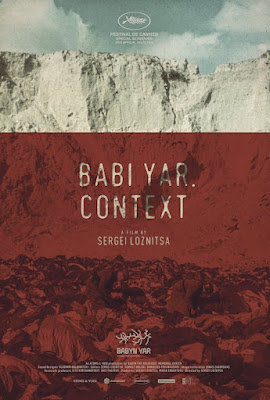As a result of its indiscriminate bombing of Ukraine, Russia just demolished several buildings that were earmarked for a memorial to the Babi Yar massacre, one of the largest mass shootings of the Holocaust. (Contrary to initial reports, the only surviving building from the incident was not hit.) So much for Putin’s so-called “de-nazification” war, launched against a country with a Jewish president, whose grandfather and great-uncles fought the real National Socialists. The events surrounding the very real and truly horrific events of the massacre are meticulously recreated in Sergei Loznitsa’s archival documentary, Babi Yar. Context, which screens today as part of MOMI during this year’s First Look.
Naturally, the Nazis did not film the actual shootings, because that would be evidence of almost 34,000 murders. It would also be unendurable to watch. Instead, most of the film consists of the events leading up to and following the killings, but there is chilling archival film of the round-ups.
Frankly, the prelude scenes are critically important to understand why so many Ukrainians welcomed the Germans. We see the bodies of prisoners hastily executed by the retreating Russians callously strewn outside their jails. We also watch Ukrainian wives claiming their husbands from POW camps that fell to the advancing Germans.
Likewise, the aftermath sequences are highly significant. Loznitsa incorporates archival film of the postwar trials (which echo the look and vibe of the show trials he documented in The Trial). Although some of the witnesses identify the victims as Jewish, the pronouncement at the executions only refer to crimes against Soviet citizens and Prisoners of War. This is not an accidental oversight. It is important to understand Russian propaganda (and Soviet propaganda before it) mostly characterized Nazi crimes as those committed against Russia and the Slavic people. Keep this in mind when you hear Putin’s disinformation today.
Loznitsa is amazingly prolific. Context is still more watchable than many of his more exhausting films. A good deal of the early footage could have been excerpted in early History Channel programming. Like most of his films, there are no talking heads this time around either—just primary video sources assembled together with minimal explanation. Therefore, it is not nearly as engaging as Mr.Landsbergis, because it lacks a personal perspective. Regardless, sensitive viewers should be warned Loznitsa does not shield viewers from the Soviet executions of the convicted German war criminals. It is brutal, but it helps explain the cancerous long-term effects of the war on Ukraine’s national soul.
In fact, Ukraine was unable to effectively deal with this trauma during the decades of Soviet occupation. It is only recently, with the election of Zelenskyy and plans for an expanded Babi Yar memorial that it is starting to come to terms with this horrific legacy. This film, from the Ukrainian Loznitsa (Belarussian-born) would be a part of that process. Unfortunately, Putin (with the help of Xi and the CCP) has set that effort back. Recommended for those who understand this is not popular history, Babi Yar. Context screens today (3/20) as part of First Look 2022 and it opens Friday, April 1, at Film Forum.

